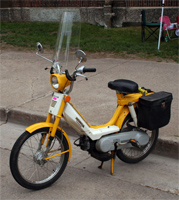 1. Cook it, boil it, peel it – or forget it
1. Cook it, boil it, peel it – or forget it
A great way to ruin a holiday is to get food poisoning or pick up hepatitis A or typhoid fever from food which has not been well prepared. As a rule of thumb, avoid consuming food that wasn’t cooked for you on the spot (e.g. skip the all-day buffets) or that wasn’t cooked at all (e.g. salads).
The same goes for fruit and vegetables: it is safer to peel them yourself than to opt for ready-made fruit salads. Also, remember to go for bottled water over tap water – water filters are a great tool for eliminating bacteria, but do not eliminate many smaller particles such as viruses. Norovirus is particularly resistant to various cooking and washing processes and a frequent cause of gastro-enteritis in holiday makers.
2. Pest control
Insect repellent helps protect you from bites which are, at best, an itchy irritation. At worst, mosquito bites can carry malaria, dengue fever, Japanese encephalitis or chikungunya virus. In areas where these diseases present a risk for travellers, apply (and reapply) mosquito repellent during daytime hours.
Where malaria is present, apply repellent from dusk till dawn when outdoors, and use mosquito nets indoors in windows or over the bed.
Ticks can also transmit diseases such as Lyme disease or Tick-borne encephalitis and are abundantly in wooded areas. Here too, some protection is provided by covering arms, legs and ankles, and using insect repellent.
Depending on your travel itinerary and length of stay, malaria tablets may also be indicated to prevent the most serious forms of the disease in highly endemic areas. Seek your doctor’s advice if this may apply to you.
3. Travel vaccines
Typhoid fever, hepatitis A and B, yellow fever, Tick-borne encephalitis – these are serious infectious diseases against which you can be vaccinated. Also some of the routine vaccinations may need a pre-travel refresher (tetanus, polio and measles). But don’t leave it too late. See your doctor one to two months in advance of your departure – vaccines need time to induce protective defence levels.
Read: Sun cream, sunglasses…vaccines?
4. Sun screen
Don’t want skin cancer? Prolonged and repetitive exposure to sunlight may cause skin cancer over time. So avoid excessive sun exposure at peak hours (usually between 11am and 3pm) and protect yourself with high-factor sunscreen. Apply, reapply. It’s that simple.
5. Be safe
At home you wouldn’t drive a car without fastening your seat belt or a moped without a helmet – or any of these under the influence of alcohol – would you?
Most travel-related health issues result from road accident injuries. Apply the same familiar principles of safety regardless of your whereabouts.
Lastly, practice safer sex and pack condoms in your luggage – sexually transmitted disease rates, including HIV, are often several-fold higher outside of Europe. Also cervical cancer is the long-term outcome of a sexually transmitted infection with Human Papilloma Virus.
Read the WHO’s travel health guidelines





Peter Quigley
November 24th, 2015
One more tip – try to plan your trip in advance. Create travel map if you are going to another city. This helps you to manage you time and visit a lot of interesting places. I am using http://well-way.com for this.
Jason
December 25th, 2015
Thank you a lot for such great travel tips here! I am going to visit some parks in Napa Valley – http://napavalleytrip.com/cat/parks/ – next summer. I want to travel there a lot of foot and on bicycle. All those statements above are very helpful, thanks a lot!